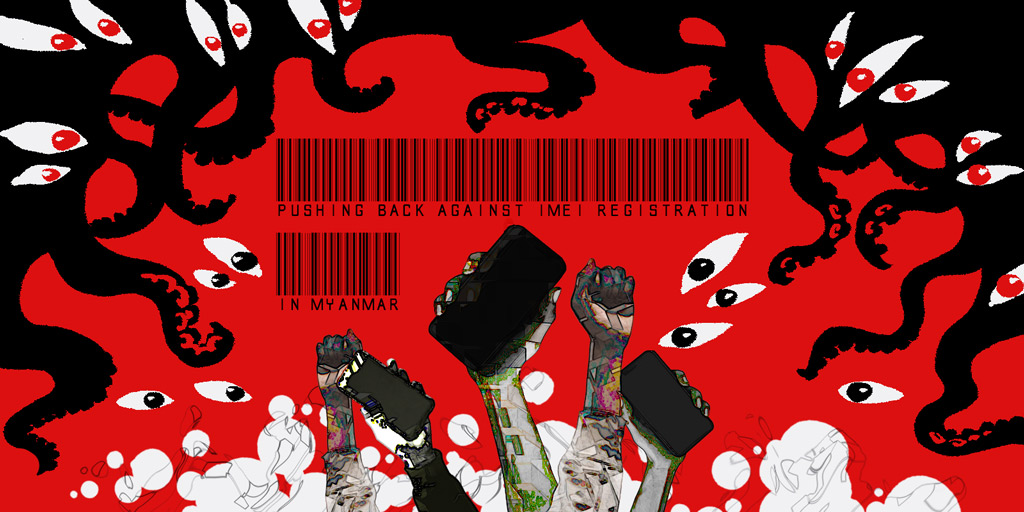မြန်မာလို ဖတ်ရန်။/ Read in Burmese
Losing connectivity in today’s Myanmar is life-threatening. When access to the internet, phone, and call services are curtailed and people are unable to communicate, they cannot contact their families, get critical information for their safety and protection, or expose the serious human rights violations that continue to escalate. The anti-coup resistance movement in Myanmar will be paralyzed if the military junta is given unbridled authority to decide who can access critical phone services and who gets cut off.
That is exactly what will happen if the military junta succeeds in implementing its plan to require registration of all International Mobile Equipment Identity (IMEI) numbers for mobile devices in Myanmar. An IMEI number is the unique identification number assigned to a mobile device – such as a cellular phone – by its manufacturer. According to the latest reports, the junta-controlled Ministry of Finance and Planning met with telecom operators on 7 June 2022 to discuss implementing the plan.
The registration requirement gives the people of Myanmar only dangerous choices: to register and be subjected to deeper surveillance, or to refuse to register and be unable to call, text, or access the internet through one’s phone.
How IMEI registration threatens connectivity
It is reported there are approximately 69.43 million mobile connections in Myanmar as of January 2021. That means that potentially millions of people who refuse to register their devices because of the security risks will not be able to text, call, or use mobile internet on their phones.
That is what happened in Indonesia in 2022 when authorities required IMEI registration, and people who were blocked because they did not register could only use their phone with WiFi connection. Those seeking to register also had problems getting connected: so many people registered that the government agency tasked with registering IMEI numbers in Indonesia could not keep up.
The connectivity challenges do not stop there. In addition to mandatory IMEI registration, the Myanmar military plans to impose a USD$3 (about 6,000 kyats) tax on each mobile phone. Mandatory SIM registration was pushed through in Myanmar prior to the coup despite fears that such a step would likely exclude a large proportion of Myanmar’s population from crucial telecommunications access; its implementation has appeared to substantiate those concerns, with millions of SIMs being deactivated. And since seizing power, the junta has forced a hike in SIM registration charges and internet taxes, making the internet costlier for Myanmar’s citizens, in an attempt to silence those using the internet to resist the coup.
How IMEI registration increases the risk of surveillance and undermines privacy
This proposed mandatory IMEI registration is the military’s latest attack in a campaign of digital authoritarianism that is deepening the suffering of people in Myanmar. Widespread surveillance is already a real threat after the military ordered all telecom operators and internet service providers to install and activate intercept technologies in their systems. Surveillance often leads to mass targeting that results in arrests, detention, assault, and even killings. That threat could potentially increase significantly because early reports indicate that a local company with links to the military will operate the IMEI registration system.
With IMEI registration in place, the military can gather information on the devices people use, including its location. In Saudi Arabia, the government reportedly used spy-grade tracking equipment and IMEI data to track women fleeing from the country, gaining access to their precise location within a few feet.
It’s possible the Myanmar military will require people to include their Subscriber Identity Module (SIM) card data when they register their IMEI numbers. As we noted earlier, people in Myanmar already have to present their National Registration Identity Card (NRIC) to register their SIMs. The NRIC contains a person’s name and address. In a country like Myanmar where data protection rules are almost nonexistent, giving the military access to these personal info is extremely dangerous. By connecting SIM data to an IMEI number, the junta could potentially trace the registered owner of any device, and gather information about calls made and received.
Why we need international pushback now
The coup in Myanmar is both physical and digital – and the international community, tech companies, telecommunications, and network providers must stand with the people of Myanmar to resist.
As we prepare this post for publication, the military has not yet confirmed or publicly announced plans for implementing the IMEI registration requirement. Now is the time to prepare for resistance. Telco operators must prepare to push back in compliance with their human rights obligations, including by engaging with civil society to discuss and address their concerns about this dangerous new development. The international community must speak out in solidarity with the people of Myanmar in defense of human rights.
For more detailed information on IMEI registration and specific mitigation measures, read our Myanmar IMEI registration FAQ.
